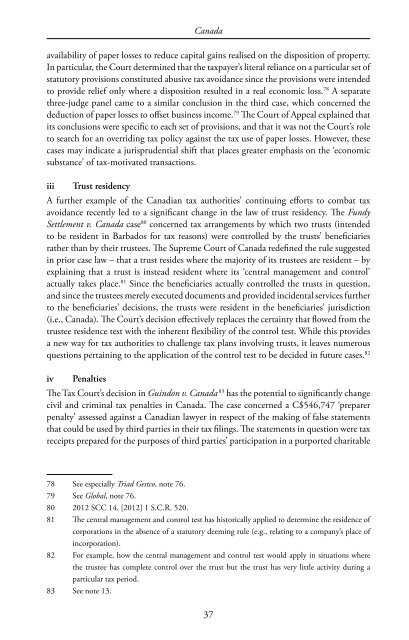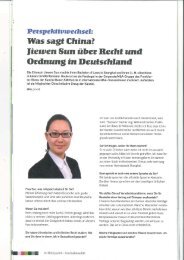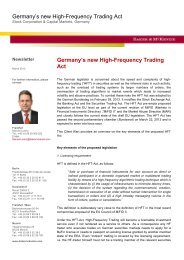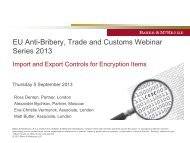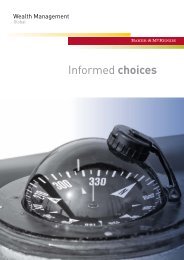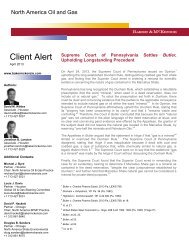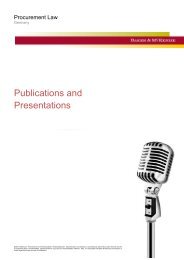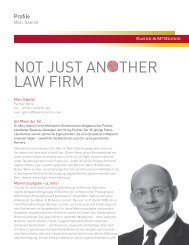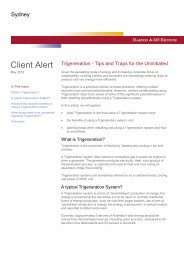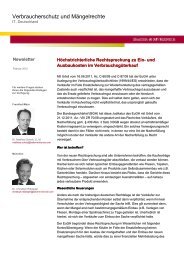Read publication - Baker & McKenzie
Read publication - Baker & McKenzie
Read publication - Baker & McKenzie
Create successful ePaper yourself
Turn your PDF publications into a flip-book with our unique Google optimized e-Paper software.
Canada<br />
availability of paper losses to reduce capital gains realised on the disposition of property.<br />
In particular, the Court determined that the taxpayer’s literal reliance on a particular set of<br />
statutory provisions constituted abusive tax avoidance since the provisions were intended<br />
to provide relief only where a disposition resulted in a real economic loss. 78 A separate<br />
three-judge panel came to a similar conclusion in the third case, which concerned the<br />
deduction of paper losses to offset business income. 79 The Court of Appeal explained that<br />
its conclusions were specific to each set of provisions, and that it was not the Court’s role<br />
to search for an overriding tax policy against the tax use of paper losses. However, these<br />
cases may indicate a jurisprudential shift that places greater emphasis on the ‘economic<br />
substance’ of tax-motivated transactions.<br />
iii Trust residency<br />
A further example of the Canadian tax authorities’ continuing efforts to combat tax<br />
avoidance recently led to a significant change in the law of trust residency. The Fundy<br />
Settlement v. Canada case 80 concerned tax arrangements by which two trusts (intended<br />
to be resident in Barbados for tax reasons) were controlled by the trusts’ beneficiaries<br />
rather than by their trustees. The Supreme Court of Canada redefined the rule suggested<br />
in prior case law – that a trust resides where the majority of its trustees are resident – by<br />
explaining that a trust is instead resident where its ‘central management and control’<br />
actually takes place. 81 Since the beneficiaries actually controlled the trusts in question,<br />
and since the trustees merely executed documents and provided incidental services further<br />
to the beneficiaries’ decisions, the trusts were resident in the beneficiaries’ jurisdiction<br />
(i.e., Canada). The Court’s decision effectively replaces the certainty that flowed from the<br />
trustee residence test with the inherent flexibility of the control test. While this provides<br />
a new way for tax authorities to challenge tax plans involving trusts, it leaves numerous<br />
questions pertaining to the application of the control test to be decided in future cases. 82<br />
iv Penalties<br />
The Tax Court’s decision in Guindon v. Canada 83 has the potential to significantly change<br />
civil and criminal tax penalties in Canada. The case concerned a C$546,747 ‘preparer<br />
penalty’ assessed against a Canadian lawyer in respect of the making of false statements<br />
that could be used by third parties in their tax filings. The statements in question were tax<br />
receipts prepared for the purposes of third parties’ participation in a purported charitable<br />
78 See especially Triad Gestco, note 76.<br />
79 See Global, note 76.<br />
80 2012 SCC 14, [2012] 1 S.C.R. 520.<br />
81 The central management and control test has historically applied to determine the residence of<br />
corporations in the absence of a statutory deeming rule (e.g., relating to a company’s place of<br />
incorporation).<br />
82 For example, how the central management and control test would apply in situations where<br />
the trustee has complete control over the trust but the trust has very little activity during a<br />
particular tax period.<br />
83 See note 13.<br />
37


